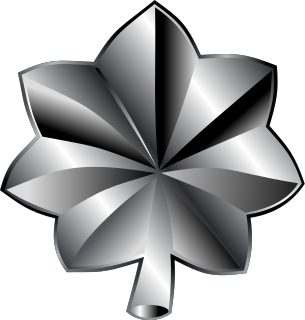Related Research Articles

In the United States Army, U.S. Marine Corps, and U.S. Air Force, a lieutenant colonel is a field-grade military officer rank just above the rank of major and just below the rank of colonel. It is equivalent to the naval rank of commander in the other uniformed services.

Lieutenant-Colonel Martin Michael Charles Charteris, Baron Charteris of Amisfield, was a British Army officer and courtier of Queen Elizabeth II.
Lieutenant-Colonel Sir Walter Hugh Malcolm Ross,, GCStJ is a member of the Royal Household of the Sovereign of the United Kingdom, and since 2006 of the household of Prince Charles.
Sir Andrew Hunter Arbuthnot Murray was Lord Provost of Edinburgh, Scotland between 1947 and 1951, Lord Lieutenant of the City of Edinburgh, and a Justice of the Peace.
Deputy Lieutenants of Aberdeen are commissioned by the Lord Provost of Aberdeen who, since 1899 by virtue of office, is also Lord-Lieutenant of Aberdeen City.
The New Year Honours 1961 were appointments by many of the Commonwealth realms of Queen Elizabeth II to various orders and honours to reward and highlight good works by citizens of those countries. They were announced on 31 December 1960 in the United Kingdom, Australia, New Zealand, Nigeria, and Rhodesia and Nyasaland to celebrate the year passed and mark the beginning of 1961.
The Queen's Birthday Honours 1958 were appointments in many of the Commonwealth realms of Queen Elizabeth II to various orders and honours to reward and highlight good works by citizens of those countries. The appointments were made to celebrate the official birthday of The Queen. They were published on 3 June 1958 for the United Kingdom and Colonies, Australia, New Zealand, Ghana, and the Federation of Rhodesia and Nyasaland.
The Queen's Birthday Honours 1959 were appointments in many of the Commonwealth realms of Queen Elizabeth II to various orders and honours to reward and highlight good works by citizens of those countries.
The Queen's Birthday Honours 1962 were appointments in many of the Commonwealth realms of Queen Elizabeth II to various orders and honours to reward and highlight good works by citizens of those countries. The appointments were made "on the occasion of the Celebration of Her Majesty's Birthday", and were published in supplements to the London Gazette of 25 May 1962.
The King's Birthday Honours 1923 were appointments in many of the Commonwealth realms of King George V to various orders and honours to reward and highlight good works by citizens of those countries. The appointments were made to celebrate the official birthday of The King. They were published on 1 and 29 June 1923.
The New Year Honours 1923 were appointments by King George V to various orders and honours to reward and highlight good works by members of the British Empire. They were published on 29 December 1922.
The 1948 New Year Honours were appointments by many of the Commonwealth realms of King George VI to various orders and honours to reward and highlight good works by citizens of those countries. They were announced on 1 January 1948 for the British Empire and New Zealand to celebrate the past year and mark the beginning of 1948.
The New Year Honours 1926 were appointments by King George V to various orders and honours to reward and highlight good works by members of the British Empire. They were published on 29 December 1925.
The King's Birthday Honours 1931 were appointments by King George V to various orders and honours to reward and highlight good works by members of the British Empire. The appointments were made to celebrate the official birthday of The King. They were published on 2 June 1931.
The 1926 Birthday Honours were appointments by King George V to various orders and honours to reward and highlight good works by citizens of the British Empire. The appointments were made to celebrate the official birthday of The King on 3 June, but it was announced on 20 May that due to the national strike, the King had approved the Prime Minister's recommendation to delay the publication of the list until 3 July 1926. The honours were effective to 5 June 1926. Per standard practice, Sir Paul Chater, who died 27 May 1926, still received the honour of Knight Commander of the Order of the British Empire as he would have received the honour if he had survived.
The 1935 New Year Honours were appointments by King George V to various orders and honours to reward and highlight good works by citizens of the United Kingdom and British Empire. They were announced on the 28 of December, 1934.
The 1924 Birthday Honours were appointments by King George V to various orders and honours to reward and highlight good works by citizens of the British Empire. The appointments were made to celebrate the official birthday of The King, and were published in The London Gazette on 3 June 1924.

The 1838 Coronation Honours were appointments by Queen Victoria to various orders and honours on the occasion of her coronation on 28 June 1838. The honours were published in The London Gazette on 20 July and 24 July 1838.

Lieutenant-Colonel Margaret Joan Spencer OBE (1912–1990), was an officer in the Australian Women's Army Service during World War II. She was responsible for raising and leading the first contingent of non-nursing and non-medical Australian servicewomen to proceed overseas on active service.

Barbara Maxwell was an Australian military officer and instructor. She entered the service as a nurse and went on to attend officers' training. Serving as an instructor, she worked her way through the ranks becoming the chief instructor at the Women's Royal Australian Army Corps (WRAAC) School in Georges Heights. Between 1977 and 1979, she served as the fourth and last director of the WRAAC, having the distinction of being the first director who had not served during wartime.
References
- 1 2 3 "Lieutenant Colonel Audrey Purton – obituary". telegraph.co.uk. Retrieved 10 September 2016.